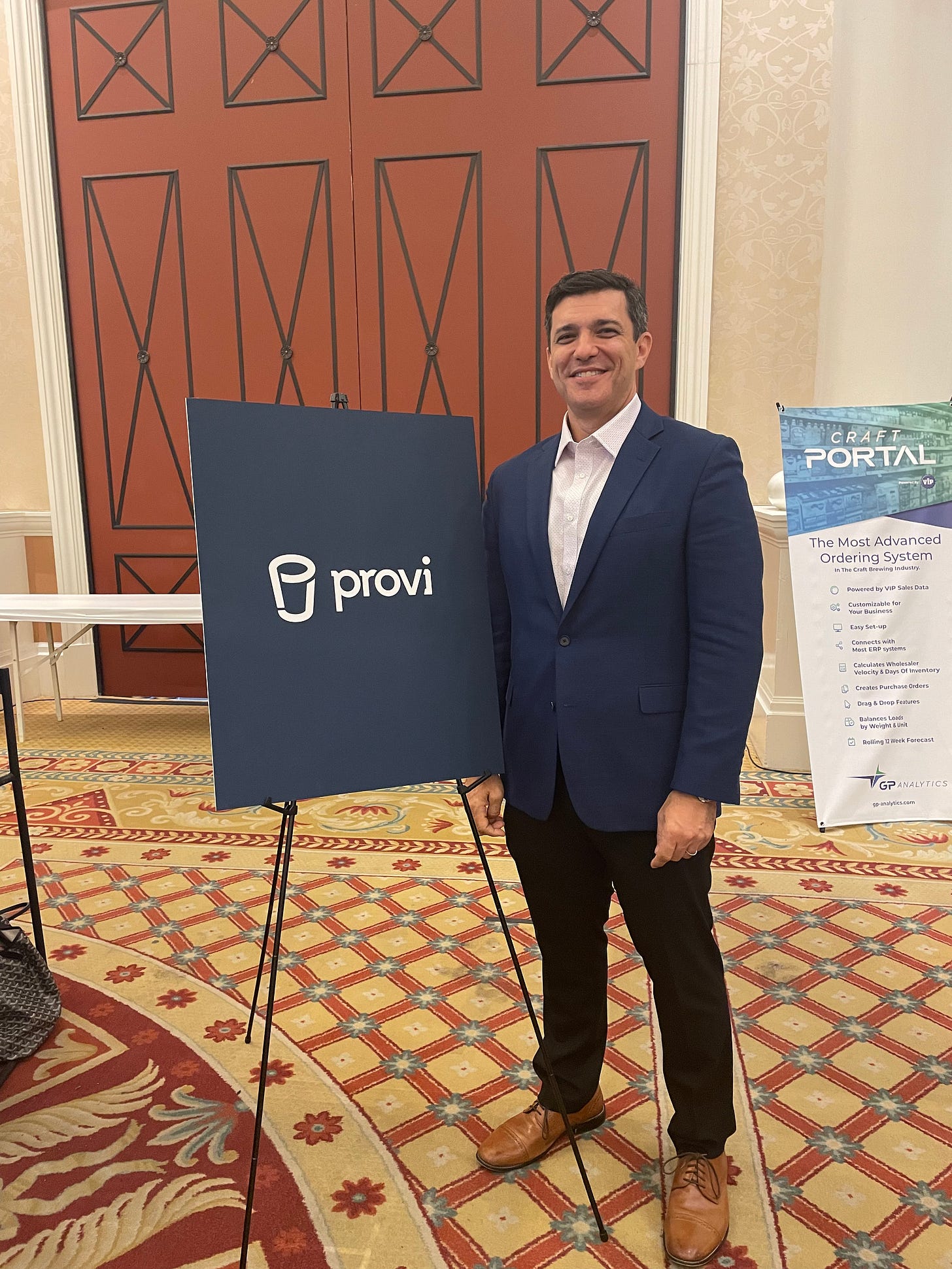Working in wine and tech is a tiny community, and you quickly discover who is the best of the best. Most of us in this small corner of this industry are very familiar with the top tier disruptors, innovators, and operators, but that's not true for the broader industry. Most wineries, retailers, and wholesalers are often unaware of the change agents who are behind the veil of technology but making macro differences for our industry through digital innovation. One of the things I enjoy most about Sips & Bytes is highlighting these all-stars beyond our wine-tech circles and helping the rest of the industry know them and see their kung fu.
Andrew Levy, the Chief Corporate Affairs officer and General Counsel for Provi, is one of those all-stars. Andrew started in law and found his way to the wine industry through one of the three corporate schools that build some of the best wine business leaders - Constellation. There, he moved from law into the guts of the business, helping catalyze sales efforts and successfully managing the unmanageable wholesaler tier. It takes superhuman intelligence, charisma, and patience to do that job. He then escaped, and as one of the many Ex-Cons (ex-Constellation), he stepped into one of the most innovative companies in recent alc-bev tech history - Provi. The 3-Tier system is simultaneously essential but also flawed and broken. Only three to four companies in history have had the appropriate model to become an actual Alc-Bev Unicorn (and not by market luck like our only other $1B Alc-Bev Tech exit).
Provi's vision as a B2B marketplace disruptor stands out from previous incarnations. If they can overcome industry inertia, they will be one of the industry's most transformative platforms to help the trade's ability to buy and sell wine.
I met Andrew through Dale Stratton, another Ex-Con, and one of the three wise men (Danny Brager, Rob McMillan, and Dale). The first thing you discover when you meet him is that he is brilliant. Full stop. He also has an incredibly high EQ, which is probably how he successfully managed wholesalers, which makes him an excellent company and a good friend. Combined with his deep operational experience in the industry, his EQ makes him a triple threat. Andrew's fingerprints are all over Provi's business model but also woven throughout the wine-tech community thanks to his advice, partner enablement, and leadership.
It’s my absolute pleasure to introduce you to Andrew Levy.
How did you become interested in the intersection of wine and digital tools? My initial interest with technology began roughly two decades ago, amidst the whirlwind of the late 90s dot com boom, when I was a young attorney honing my craft. It was a time of frenetic innovation. However, the intersection of my tech intrigue with the wine sector emerged during my tenure in the commercial realm of Constellation Brands. During this time, we spearheaded the development of internal tools aimed at empowering our sales teams through the utilization of mobile technology. By combining various data sources and leveraging geotargeting and machine learning (way before AI!), we were able to derive product recommendations, significantly amplifying our field presence and enhancing point-of-sale impact.
Could you share a noteworthy or exciting achievement or project at your company that excites you or is bragworthy?
Provi's mission is to bring greater efficiency to the beverage alcohol industry and the existing three-tier system. We are extremely proud that we've been able to scale our impact through the adoption of our B2B online marketplace by large national chains throughout the U.S., such as Olive Garden, PF Changs and Capital Grille.
For these national retailers, beverage ordering presents a significant challenge as they navigate the complexities of managing their beverage alcohol portfolios across a multitude of distributors spanning various states. Crafting beverage programs for such chains entails setting corporate mandate lists dictating the permissible items across wine, spirits, and often beer categories.
Our marketplace effectively addresses many of these pain points, offering tools uniquely tailored to the intricate challenges faced by national chains. The impact on their operations has been profound. At the individual location level, we've helped streamline staff onboarding, enabling Beverage Managers to redirect their attention towards enhancing the overall guest experience.
On a corporate level, our marketplace facilitates effortless enforcement of product mandates and lists customized to each location, ensuring brand consistency across the board. Most importantly, we equip corporate teams with robust analytics, empowering informed decision-making regarding beverage programs. This enhanced visibility enables companies to optimize inventory levels and swiftly adapt to evolving market dynamics.
Having been in the industry as long as I have, it has been truly exhilarating to witness the tangible benefits of integrating technology within the framework of the three-tier system.
Name three wines you think are wonderful.
Mazzocco Rockpile Reserve Zinfandel 2015: My wife and I discovered this on a wonderful trip to Sonoma with another couple. The trip was full of incredible memories that still make me laugh to this day. So, grabbing one of the few remaining bottles I have at home brings me back to that joyful experience.
Marques de Vargas Rioja Reserva 2017: This is a bottle which I enjoyed on a trip to San Sebastien last year. This region will forever have a special place in my heart.
Perrier-Jouet Blason Rose Champagne: I originally purchased this as a wedding gift for a close friend but now save it for myself for special occasions.
Do you admire any digital companies or initiatives in the wine industry? What sets them apart?
In my view, one of the most commendable developments in the wine industry is the increasing focus on the digital aisle. While the transition may not always be straightforward or uniformly adopted, suppliers of all sizes now recognize the pivotal role that digital content plays in shaping their brand identity and go-to-market strategy.
I believe Pix was onto something significant with its innovative approach to merchandising, user interface design, and harnessing data potential. However, despite its forward-thinking vision, Pix perhaps fell victim to the timing, entering a market that was still fragmented and evolving.
In your opinion, what makes the process of digital transformation particularly difficult?
The biggest challenge in digital transformation lies in the dual misconception: some are hesitant or even fearful of technology, while others overly rely on it too heavily to fix all their problems.
The reality is, the crux of digital transformation lies in reviewing existing business practices, both within your own organization and among your partners, to identify operational strengths and weaknesses. Only then can you develop or procure technology solutions tailored to future needs.
Far too often, digital transformation initiatives falter or fall short because they digitize pre-existing broken or disjointed processes, rather than fundamentally reimagining and optimizing them for the digital age.
Could you share examples of non-wine-related digital marketing campaigns that have inspired you, and what lessons can the wine industry draw from them?
I've always been impressed with Apple's approach to differentiating its product lineup. The way they can appeal to high-end consumers with simplicity serves as a masterclass in brand building. While surveys consistently reveal that consumers prioritize price when purchasing wine, they often struggle to value their selection. This disconnect leaves a lingering 'bad taste' in consumers' mouths that even a $100 bottle of wine cannot cure.
The wine industry would benefit from adopting Apple's strategy of signaling quality to consumers in a straightforward manner. By doing so, the industry could empower consumers to navigate the overwhelming array of choices in the wine aisle with confidence, ensuring they feel more informed and satisfied with their purchases.
How has the digital landscape in the wine industry evolved over the past few years, and what trends do you foresee in the near future?
The wine industry has made significant strides in providing direct-to-consumer technology platforms for wine enthusiasts. However, the proliferation of these platforms has reached a tipping point, resulting in a landscape cluttered with a myriad of confusing options that can overwhelm consumers. This is not sustainable in the long run, and I would expect to see further consolidation of these platforms.
What advice would you give small or boutique wineries with limited resources looking to compete in the digital space with larger wine producers?
You can't be all things to all people. Know who you are and who your customers are at a deep level. Then, execute ruthlessly and focus on that. A focused strategy enables and empowers you to say no to all of the flashy, trendy "squirrels" that will entice and distract you.
In your experience, what are some common misconceptions or pitfalls that wineries should avoid when implementing digital strategies?
Understand that your success is not someone else's responsibility. Your distributor, your e-commerce provider, and your shipper are not the owners of your success. You are. Recognize that you need to build your brand, sample consumers, execute sales initiatives, and innovate in response to or ahead of the market. Once you own that, you can prioritize your time and resources to win.
Next week on Sips and Bytes - Higlighting another digital Andrew Groom from The Wine Group.










